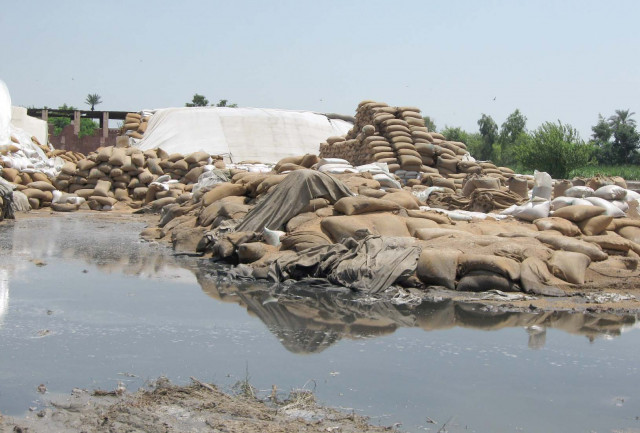Caught between duty and family
As flies swarm over rotting wheat at a godown in Kot Addu, two men argue over uneven aid distribution.

“Why don’t you think before you speak!” yells Muhammad Aslam, when his friend says that they should stop expecting the government to help them. “This is Pakistan, after all,” the friend says sarcastically.
They halt their argument to look again at the stockpile of wheat, which has been partly destroyed by the flood water entering the godown. Both of them work in the facility, which often hires over 100 labourers to stock wheat. Stagnant pools of water mix with the spoiled wheat that has spilled out of protective plastic bags. The workers complain they are getting sick. One of them sits with a kerchief wrapped around his mouth as the pungent smell and the flies make it impossible to breathe.
Aslam’s village is seven kilometres away from Sanawan. The floodwater hit his village earlier this month.
“We’ve been sitting on a teela (dune),” he rages when asked about the state of his village. “There were 150 houses in our village. There are only six left. Everything else went into the water.”
“Do you use boats to get out?” I ask.
“Boats?” he repeats incredulously. “We walk through the water. When your children are sick, you will do anything. Diseases are spreading there. Children have malaria … they keep coughing, they keep vomiting.”
A father of three, Aslam fumes over the government’s response to his village’s predicament. “They say we can’t reach you because the village is still surrounded by water, so come out and get into a relief camp. If they can’t reach us, how do they expect us to leave?”
“My only request to the government is to send tents and medicine.”
Aslam is a watchman, entrusted with taking care of the wheat that is crucial to sustaining millions of people throughout the country. But his duties at the godown clashed with protecting his family from the floods that swept through Kot Addu and adjoining areas such as Sanawan.
Aslam’s anger rings through the air.
“The day the flood came, I was on duty here … and my children were sleeping under the open sky.”
Published in The Express Tribune, August 23rd, 2010.



















COMMENTS
Comments are moderated and generally will be posted if they are on-topic and not abusive.
For more information, please see our Comments FAQ